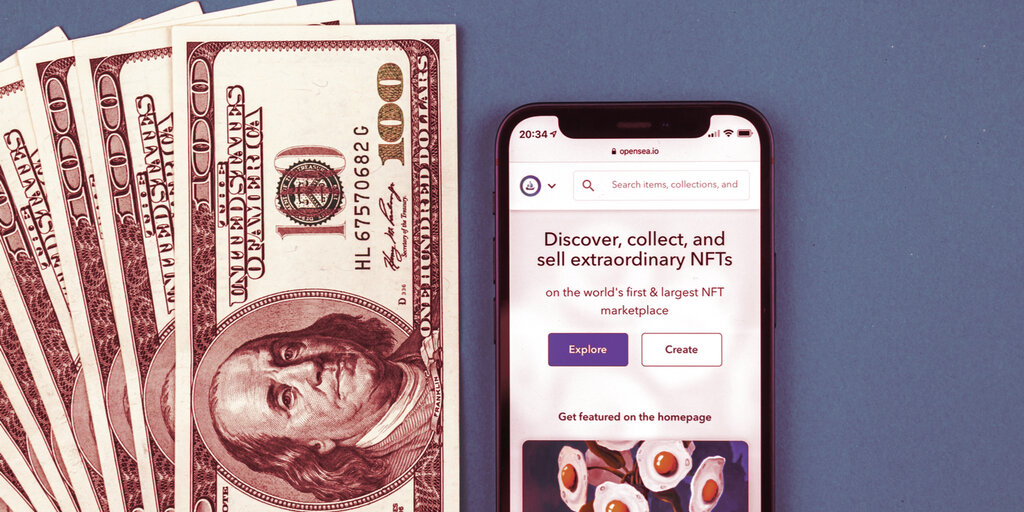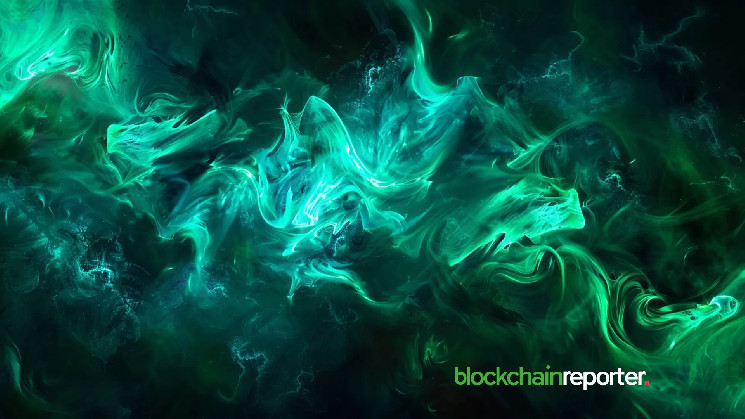
In brief
- OpenSea shared its plans regarding NFT creator royalties, amid a growing trend of rival marketplaces not honoring them.
- Notable creators suggest that OpenSea’s messaging is unclear and potentially misleading, and that part of its plan is anti-competitive.
As many NFT platforms shifted away from honoring creator-set royalties in recent weeks, top marketplace OpenSea had remained silent on the subject, apparently weighing its options. On Saturday night, the $13.3 billion startup finally showed its hand—but OpenSea’s newly expressed strategy isn’t sitting well with many prominent Web3 creators.
In a Twitter thread, OpenSea shared what it called a “thoughtful, principled approach” to NFT royalties, including the rollout of a system that would let creators of new projects blacklist certain marketplaces that do not require traders to pay royalties. That system takes effect on November 8.
OpenSea said that it is still considering what to do about existing NFT projects, and that it will garner additional community feedback ahead of a self-imposed December 8 deadline. After that date, the marketplace will make a decision—which could ultimately include making royalty fee payments optional for traders, as some other marketplaces have done.
There’s been a lot of discussion over the past few months about business models for NFT creators & whether creator fees (“royalties”) are viable.
Given our role in the ecosystem, we want to take a thoughtful, principled approach to this topic & to lead w/ solutions. 🧵
— OpenSea (@opensea) November 6, 2022
“In transparency, the consideration set for what happens after Dec 8 is wide open—[with] options ranging from continuing to enforce off-chain fees for some subsets of collections, to allowing optional creator fees, to collaborating on other on-chain enforcement options for creators,” the marketplace tweeted.
In an accompanying blog post, OpenSea co-founder and CEO Devin Finzer detailed the firm’s history of honoring NFT royalties—typically a 5% to 10% fee set by the creator, which is paid by the seller on any secondary market sale. These royalty expectations are not fully enforceable on-chain, however the largest marketplaces (including OpenSea) have typically honored them.
In recent months, many upstart and rival marketplaces have attempted to claw away market share by offering zero-royalty trading, or making them optional. Nearly the entire Solana NFT market now operates with those models, after Magic Eden made royalties optional for traders, and Ethereum platforms like X2Y2, LooksRare, and Blur have followed suit.
When creator royalty fees aren’t required, many traders opt not to pay them. Data from X2Y2 in late October, shared by pseudonymous Proof Director of Research Punk9059, showed that just 18% of traders bothered to pay any royalty amount. “Free riding is too easy,” they said.
A month ago, around 75% of NFT buyers opted-in to paying royalties on x2y2, when given the choice.
Now that number is around 18%
The idea of “tip jar” royalties where buyers can opt-in or opt-out will likely prove to just be a 0-royalty policy over time
Free riding is too easy pic.twitter.com/BAG9VfI18q
— NFTstatistics.eth (@punk9059) October 28, 2022
Finzer attempted to take a firm stance in his post, writing in partially-bolded text, “It’s clear that many creators want the ability to enforce fees on-chain; and fundamentally, we believe that the choice should be theirs to make—it shouldn’t be a decision made for them by marketplaces.”
However, OpenSea’s overall message isn’t resonating as clearly as that single comment, with many NFT creators sounding the alarm on social media over what they believe are misleading comments or unclear intentions over the marketplace’s true path forward.
Blacklisting rivals
OpenSea’s new enforcement system provides code for Ethereum NFT creators to insert into their newly-launched NFT smart contracts, which points to a blacklist that blocks those NFTs from being traded at any listed zero-royalties or royalties-optional marketplaces. Smart contracts contain the code that powers NFT projects and autonomous decentralized apps (dapps).
It’s a similar approach to that recently taken by famed generative artist Tyler Hobbs for his new QQL project. Hobbs and collaborator Dandelion Wist implemented a similar blacklist that bars the NFTs from being traded on platforms that don’t respect creator royalties. X2Y2, in particular, complained about being blacklisted, suggesting that it compromised NFT owners’ rights.
Fellow creators widely supported Hobbs and Wist on their project-centric blacklist. But in OpenSea’s case, the blacklist is a who’s who of direct competitors: X2Y2, LooksRare, Blur, and SudoSwap. The firm’s guidance for creators to block those marketplaces looks anti-competitive to some NFT traders and creators, who have sounded off on Twitter.
“OpenSea is losing market share to other marketplaces that are excising creator royalties,” tweeted Bobby “Bobby Hundreds” Kim, co-founder of fashion brand The Hundreds and the Adam Bomb Squad NFT project. “So, this solution is a convenient value proposition. It blocks their competitors AND ensures that artists on their platform get paid on secondary sales.”
Angharad “Harri” Thomas, Director of Product at Proof, tweeted that the move may only further centralize market power and dominance for the platform. “OpenSea royalties are completely off-chain,” she wrote. “They are actually saying, ‘If you block our zero-royalty competitors in your contract, we’ll turn on royalties for you in our centralized system.’”
‘Misleading’ messaging
The bigger question, arguably, is what OpenSea’s plans mean for creators of existing NFT projects. The firm said that it could make royalties optional for traders, but it may also enforce them for “some subsets of collections” or utilize other potential enforcement methods ahead. Creators may need to change their projects and deploy new contracts to utilize such methods.
It’s all unclear for now, and Finzer’s affirmation towards honoring royalties isn’t much assurance for some creators and traders. After all, top Solana marketplace Magic Eden backed royalties and said it would continue to honor them—and then flip-flopped only days later as rivals chewed away at its market share. Some have alleged similar smoke and mirrors tactics from OpenSea.
“[In my opinion], the OpenSea announcement is a clever reframing of taking existing collections to zero royalties,” wrote Betty, the pseudonymous co-creator of NFT project Deadfellaz. “This will disproportionately fuck over emerging artists and marginalized creators who will need to turn to VC funding. Statistically, over 95% of VC funding goes to men.”
She remained unconvinced after speaking with OpenSea executives today. “It feels like there is no plan, and no clear answers were given in regards to existing collections and artist’s royalties,” she tweeted. “Communication has been misleading and facts are not there.”
Artist Ryan “ThankYouX” Wilson suggested that the announcement was “another slap in the face from OpenSea to creators,” and that “they just want to confuse people into thinking they care and are helping us.” He added that the news was supposed to come out on Monday, and that OpenSea “rushed it out” to preempt creator concerns over the initiative.
After speaking with @opensea it feels like there is no plan and no clear answers were given in regards to existing collections & artist’s royalties. Communication has been misleading and facts are not there. Speak up if you feel a certain way about this because it has impact.
— BETTY (@betty_nft) November 6, 2022
In setting a deadline that’s at least one month out, OpenSea is taking a more deliberate and public approach towards deciding royalties than many of its competitors (although Rarible has already taken a stand for royalties). Still, some artists are skeptical of OpenSea’s aims, and they’re trying to rally people in the NFT space to help get the message across.
“Philosophically, abandoning creator royalties throws the entire mission of Web3/NFTs off,” Bobby Hundreds tweeted. “Until now, the primary thesis for this remarkable technology has been ensuring that artists get paid for their work.”
“Therefore, it is now on you, the collectors, the creators, and the critics, to be heard and decide what happens,” he added. “As the biggest mainstream NFT marketplace, if OpenSea subtracts creator royalties, it will significantly impact the entire ecosystem.”
Stay on top of crypto news, get daily updates in your inbox.
Sourced from decrypt.co.
Written by Andrew Hayward on 2022-11-06 20:37:26.








